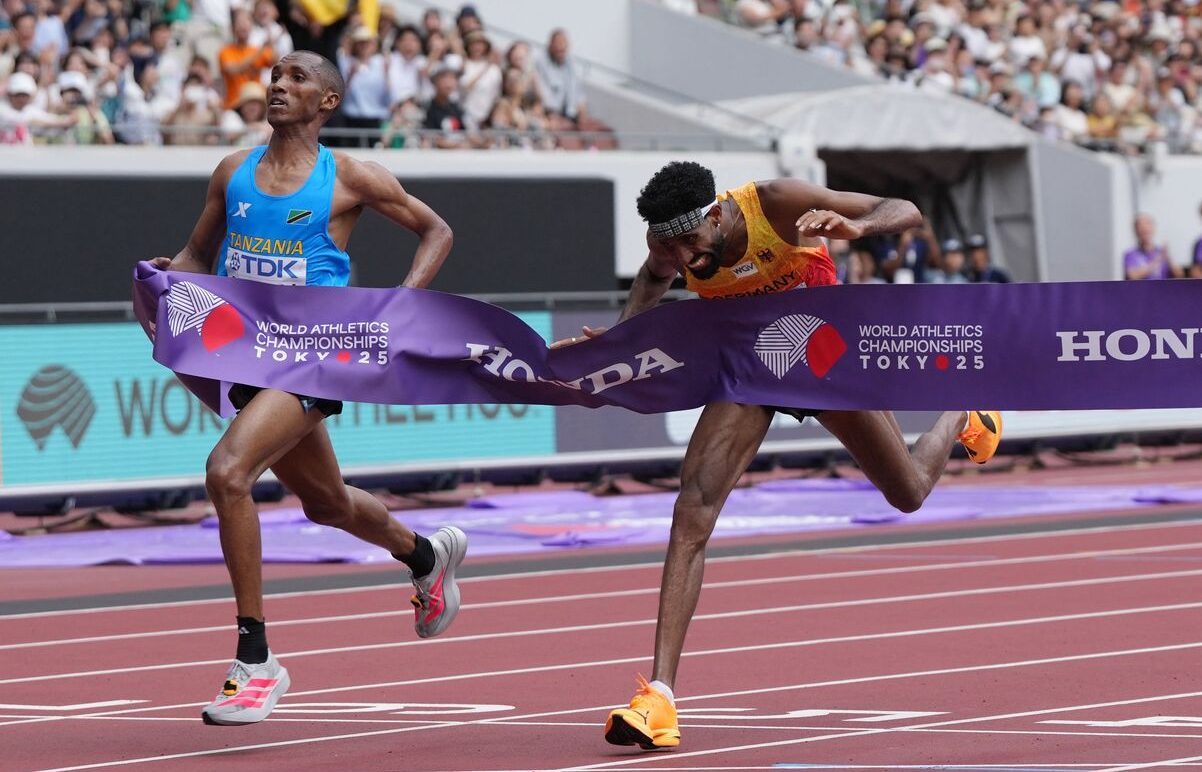
Perseverance paid off for Tanzania's Alphonce Felix Simbu. His longstanding quest to become a world marathon champion finally came to fruition on Monday, September 15.
In a marathon race that will be remembered for decades to come, Simbu edged Germany's Amanal Petros by 0.03 seconds at the 2025 World Athletics Championships.
Both men officially crossed the finish line in 2 hours, 9 minutes, 48 seconds. But high-tech video footage of the race confirmed that Simbu triumphed by mere split seconds at Tokyo's National Stadium.
What a finish!
Both men sprinted to the finish line, and Simbu ignited a national celebration in Tanzania by becoming his nation's first-ever gold medalist at the World Athletics Championships.
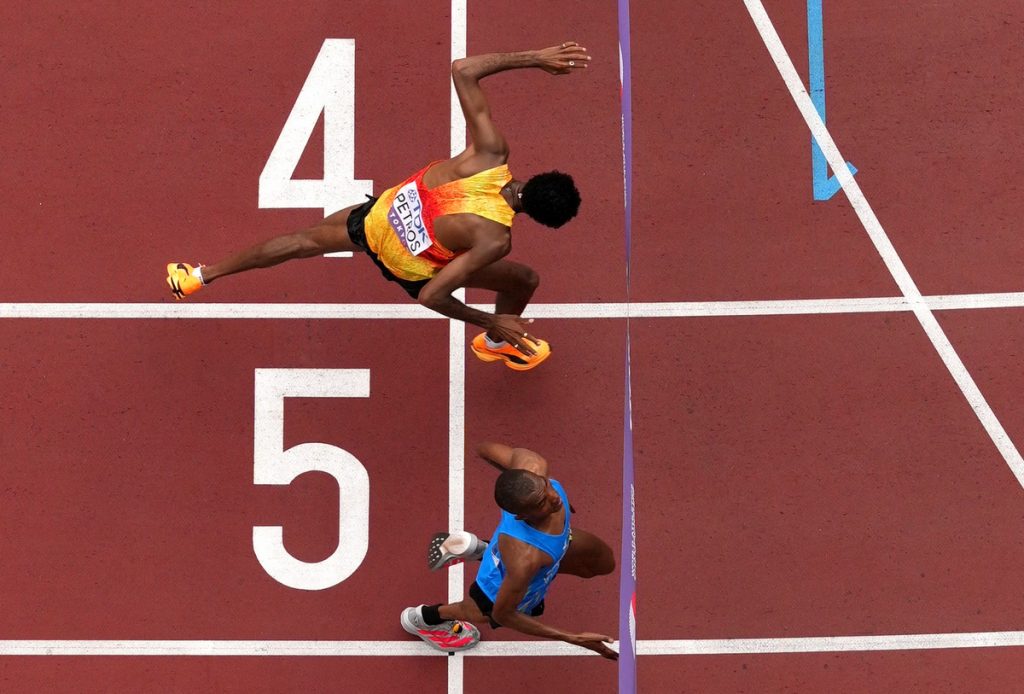
One of the most enjoyable aspects of major international sporting events is the collective excitement they bring to large groups of people. Exhibit A: Tanzania after Simbu's victory in the Japanese capital.
Simbu perfectly summed up the excitement in his homeland, a nation in eastern Africa with an estimated population of 67.4 million in 2024, according to the CIA World Factbook.
"Today means celebrations in Tanzania," he said. "We have written [a] new history as a country. It was my dream. I am at peace. It is about discipline, training and never giving up."
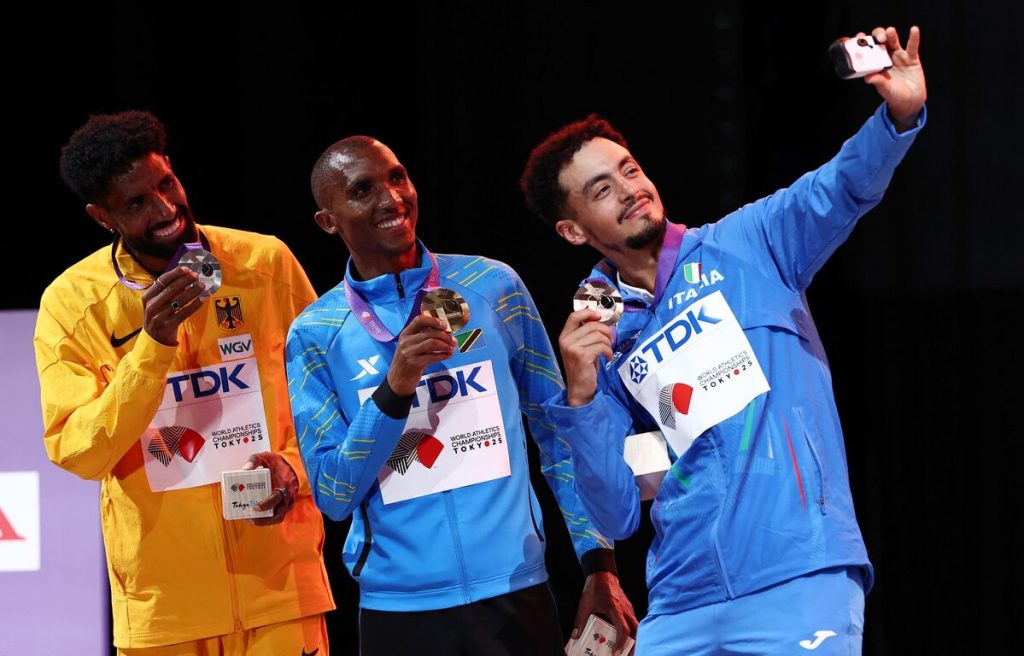
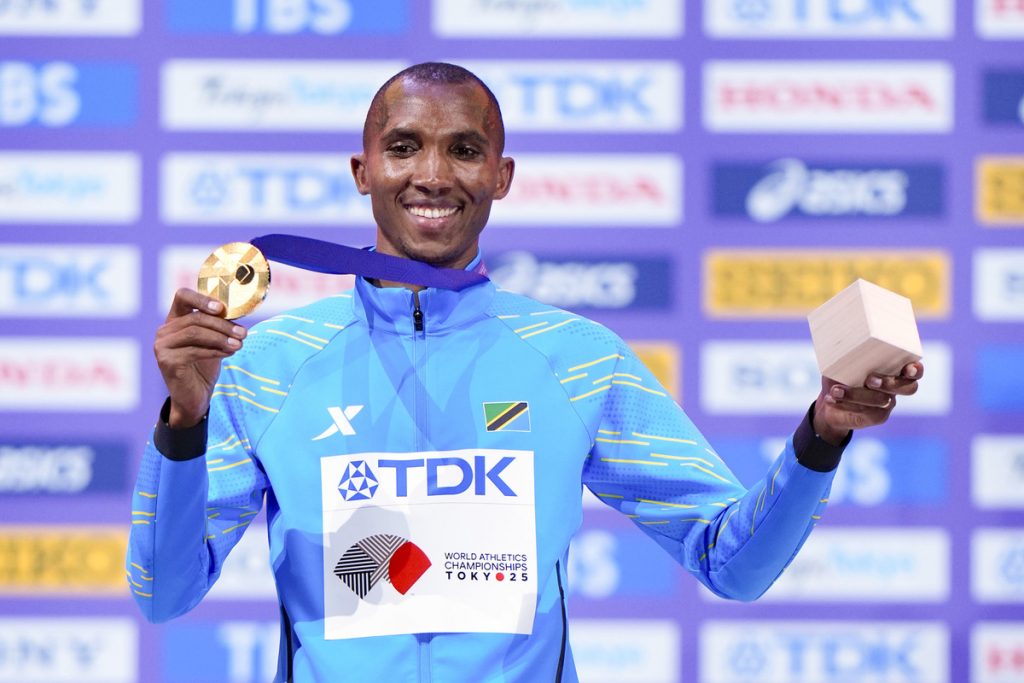
The Arduous Journey to a World Marathon Title
In 2017, Simbu collected the bronze medal at the worlds in London, clocking 2:09:51. He didn't finish the marathon at the 2023 edition of the meet in Budapest.
In between, Simbu, was the 16th-place finisher at the 2019 World Athletics Championships in Doha.
More recently, he was the runner-up at the 2025 Boston Marathon on April 21, reaching the finish line in 2:05:04.
What's more, he was fifth at the 2016 Rio de Janeiro Olympics and seventh at the Tokyo Games in 2021. And he earned the silver medal at the 2022 Commonwealth Games in Birmingham, England.
Simbu, now 33, had a career-best time of 2:04:38 at Spain's Valencia Marathon on December 1, 2024, placing fourth overall.
For Simbu, confidence in his abilities and dedication to putting in the long hours of training needed to stay in shape are interconnected traits.
"I remember in 2017, at the world championships in London, I won bronze," Simbu told reporters after grabbing his historic gold in Tokyo. "Then I ran many times but never got any medals, so finally it is here. When I arrived here, I told myself I was not going to give up."
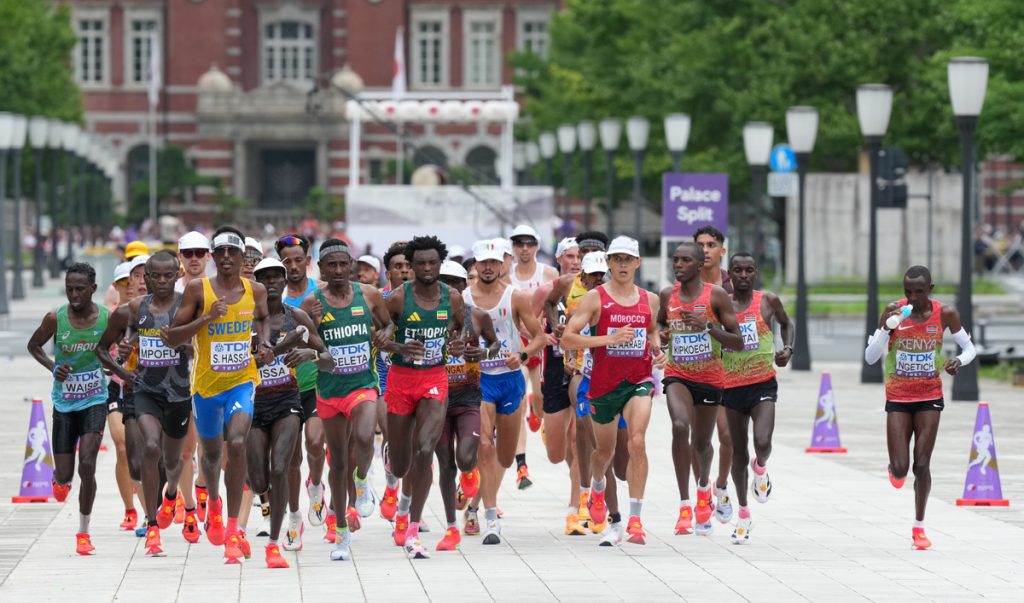
From Start to Finish: How Simbu Won the Marathon
What was the Tanzanian's race strategy for the 41.195-km event in the Japanese capital?
"I just stayed with the group, it helped me and it ended really well," Simbu pointed out. "Just look at the finish and the kick."
He then said, "When we entered the stadium, I was not sure if I would win. I did not know if I won. But when I saw the video screens and me on the top of the results, I felt relieved."
A quick glance at the overall race statistics demonstrates that Simbu "just stayed with the group."
For instance, he was in 10th place at the 10-km mark, and after 20 km he was 30th (1:01:57).
Simbu was 17th at the 30-km mark and 10th after 35 km.
Through 40 km, he was in fifth place (2:03:33). From that point on, Simbu and Petros each ran 6 minutes, 15 seconds to reach the finish line.
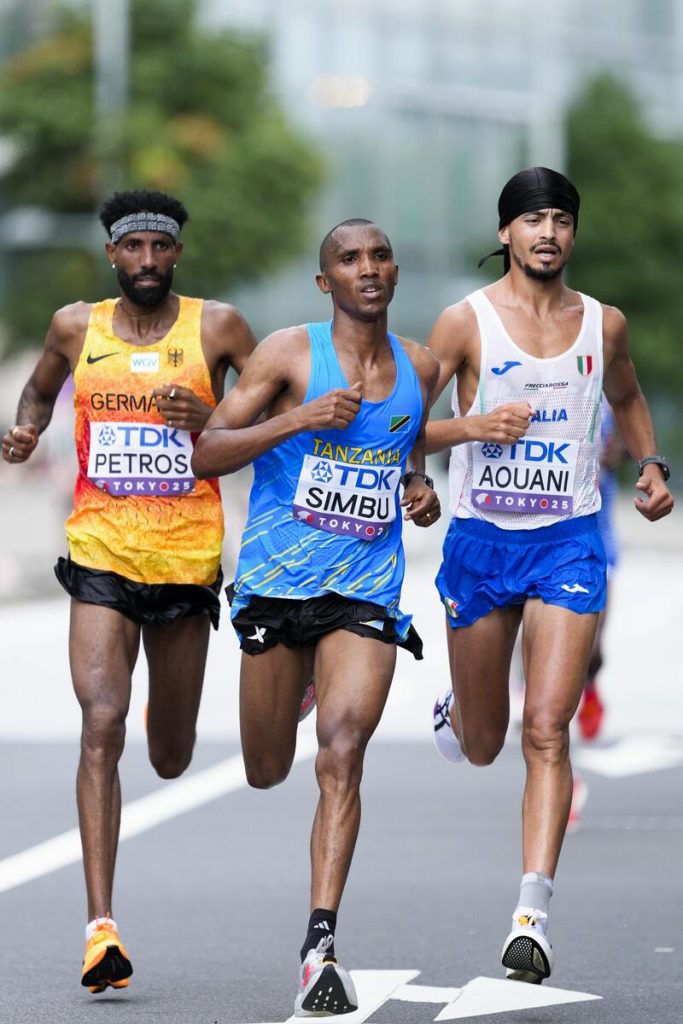
Petros, a 30-year-old Eritrean-born runner, made a profound statement after the race.
"I have never seen something like this in the marathon ― both races (men and women) came down to a sprint finish. It's like the 100 meters," Petros told reporters.
The marathon runner-up also shared his thoughts on getting ready for and competing in Tokyo.
"This is four months of hard work in training ― running, eating and sleeping," Petros commented. "It was hard. But this silver gives me energy and motivation that I can win bigger competitions."
Petros continued: "I was so sure I was winning, he (Simbu) surprised me. He kicked like crazy. I accept I lost today but tomorrow I can win. Today is a learning experience."
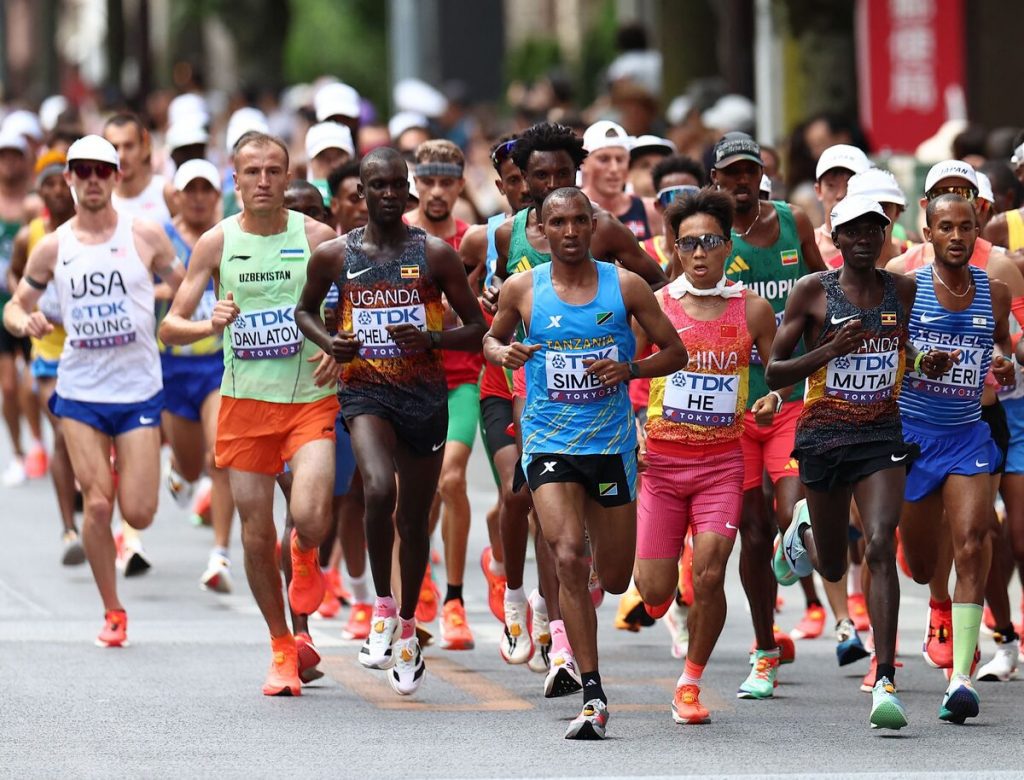
Getting Ready for the Marathon in Tokyo
For elite-level athletes, an adjustment in a training routine can make a big impact.
Longer workouts or a variation in locations may prove beneficial.
The latter proved to be the case for Simbu, the 17th-place finisher at the 2024 Paris Olympics.
"Before this event, I was training in Tanzania and the conditions there helped me to win this race," he said on Monday.
He explained that past experience prompted his decision to alter his training routine.
"I remember, when I was in Paris last year (at the Olympics), it was very challenging for me ― the hills, all ups and downs," Simbu told reporters. "So before Tokyo, I decided to train on different surfaces. Sometimes I went to hills, and that's what made the difference here. I had many tough moments during the race, but I told myself that I would never give up."
What's next for Alphonce Felix Simbu, the pride of Tanzania?
"I got an invitation for the New York City Marathon [in November]," he reported. "So now I will talk to my agents and see if it is possible to go because this was a tough race."
RELATED:
- ASICS' New Marathon Shoe Weighs Only 129 Grams
- Mondo Duplantis Sets 14th World Record to Win the Gold in Tokyo
- Oblique Seville Wins the 100-Meter Title at the World Championships
- JAPAN SPORTS NOTEBOOK | Athletics: Hayato Katsuki Finishes 3rd in 35-km Race Walk at the Worlds
- New Documentary 'The Distance' Explores Naoko Takahashi’s Journey to Become Marathon Gold Medalist
Author: Ed Odeven
Find Ed on JAPAN Forward's dedicated website, SportsLook. Follow his [Japan Sports Notebook] on Sundays, [Odds and Evens] during the week, and X (formerly Twitter) @ed_odeven.

Nagoya Basho Tournament Records
| Day | Opponent | Result |
|---|




















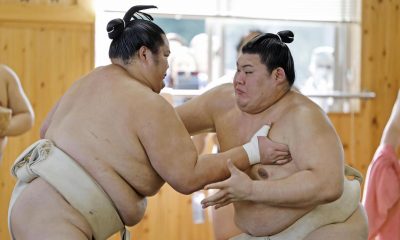
You must be logged in to post a comment Login